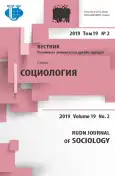Paradoxes of the higher education modernization: Results of the 20-year monitoring in the Sverdlovsk Region
- 作者: Vishnevsky Y.R1, Narkhov DY.1
-
隶属关系:
- Ural Federal University named after the first President of Russia B.N. Yeltsin
- 期: 卷 19, 编号 2 (2019)
- 页面: 289-301
- 栏目: Surveys, experiments, case studies
- URL: https://journal-vniispk.ru/2313-2272/article/view/340360
- DOI: https://doi.org/10.22363/2313-2272-2019-19-2-289-301
- ID: 340360
如何引用文章
全文:
详细
The article considers modernization of the Russian higher education based on the data of the regional monitoring (1995-2016). The methodology of the research consists of the multidimensional approach (combination of systemic, institutional, resource and other approaches) and interpretations of modernization of the higher education as an integral part of modernization of the social-economic system of Russia. Modernization of the higher education is defined as a continuous process of transformational changes focused on improving the quality and competitiveness of all subsystems of the higher education. The article aims at explaining how modernization affects the resource potential of students, at showing to what extent students see its results and can use the opportunities provided by it. The authors focus on the question whether modernization is implemented for students, with or without students: how the quality of education changes due to modernization, how it affects the students’ satisfaction with the quality of education and professional training. The article reveals the paradoxes of modernization in terms of achieving its main goal - training of highly qualified professionals satisfying the needs of the economy in personnel; and points to the strengthening of material, technical and financial educational inequality of Russian regions and sectors of economy. The quality of the higher education is considered a way of social self-regulation. Its indicators include students’ satisfaction with different aspects of education important for the development of professional knowledge. The article presents the students’ estimates of the accessibility of the higher education in the Sverdlovsk Region by such basic indicators of modernization as academic mobility, informatization, relationship of education, science and production. Based on the results of the monitoring the authors prove the low impact of modernization changes on the students’ satisfaction with the quality of education and professional training.
作者简介
Yu Vishnevsky
Ural Federal University named after the first President of Russia B.N. Yeltsin
编辑信件的主要联系方式.
Email: soc_stu@e1.ru
-
Mira St., 19, Ekaterinburg, Russia, 620002D Narkhov
Ural Federal University named after the first President of Russia B.N. Yeltsin
Email: d_narkhov@mail.ru
-
Mira St., 19, Ekaterinburg, Russia, 620002参考
- -12 resheniy dlya novogo obrazovaniya: ekspertny doklad [12 decisions for the new education: An expert report]. Ya.I. Kuzminov, I.D. Frumin. Moscow; 2018 (In Russ.).
- Bannikova L.N., Boronina L.N., Vishnevsky Yu.R. Novye yavleniya v tsennostnyh orientaciyah uralskogo studenchestva [New phenomena in value orientations of the Ural students]. Sociologicheskie Issledovaniya. 2013; 2 (In Russ.).
- Vishnevsky Yu.R., Rubina L.Ya. Socialny oblik studenchestva 90-h godov [Social features of students of the 1990s]. Sociologicheskie Issledovaniya. 1997; 10 (In Russ.).
- Vishnevsky Yu.R., Shapko V.T. Student 90-h — sociokulturnaya dinamika [The student of the 1990s — social-cultural dynamics]. Sociologicheskie Issledovaniya. 2000; 2 (In Russ.).
- Vishnevsky Yu.R., Shapko V.T., Trynov D.V. Grazhdanskaya kultura studentov. Tendentsii i problemy formirovaniya [Civil culture of students. Tendencies and challenges of development]. Sociologicheskie Issledovaniya. 2009; 4 (In Russ.).
- Gromov A.D., Platonova D.P., Semenov D.S., Pyrova T.L. Dostupnost vysshego obrazovaniya v regionah Rossii. [Accessibility of the Higher Education in Regions of Russia]. Moscow; 2016 (In Russ.).
- Davydov A.A. Modernizatsiya Rossii, polezny opyt Kitaya i teoriya slozhnyh sistem [Modernization of Russia, useful Chinese experience, and theory of complex systems]. http://socioline.ru/files/6/183/modernizaciya_rossii_poleznyy_opyt_kitaya.doc (In Russ.).
- Zaslavskaya T.I. Sovremennoe rossijskoe obshchestvo: socialny mekhanizm transformatsii [Contemporary Russian Society: Social Mechanism of Transformation]. Moscow; 2004 (In Russ.).
- Inozemtsev V.L. Khoroshee obrazovanie v Rossii — mif [Good education in Russia is a myth]. Vedomosti. 3.10.2011 (In Russ.).
- Konceptsiya modernizatsii rossijskogo obrazovaniya na period do 2010 goda (Prilozhenie k prikazu Minobrazovaniya Rossii ot 11.02.2002 No. 393) [Concept of modernization of the Russian education until 2010 (Annex to the order of the Russian Ministry of Education of 2.11.2002 No. 393)] (In Russ.).
- Mezhdunarodny studenchesky obmen [International student exchange]. https://urfu.ru/ru/ international/mobility. (In Russ.).
- Narkhov D.Yu. Prepodavateli vysshej shkoly kak resurs modernizatsii vysshego professionalnogo obrazovaniya [Teachers as a Resource of the Higher Education Modernization]. Avtoreferat diss. k.s.n. Ekaterinburg; 2015 (In Russ.).
- Ob obrazovanii v Rossijskoj Federatsii [Federal Law ‘On Education in the Russian Federation’]. FZ No. 273 of 29.12.2012
- Rubina L.Ya. Rossijskaya magistratura: realnost', perspektivy, riski [Russian Master’s Studies: realities, prospects, risks]. Sociokulturnoe razvitie bolshogo Urala: trendy, problemy, perspektivy. Ekaterinburg; 2016 (In Russ.).
- Student 1995—2016 gg.: dinamika sociokulturnogo razvitiya studenchestva Srednego Urala [Student of 1995—2016: Dynamics of Social-Cultural Development in the Middle Urals]. Vishnevsky Yu.R. (Ed.). Ekaterinburg; 2017 (In Russ.).
- Tomiltsev A.V. Upravlenie kachestvom obrazovaniya [Management of the Education Quality]. Ekaterinburg; 2010 (In Russ.).
- Toshchenko Zh.T. Prekariat — novoe yavlenie na rynke truda [Prekariat — a new phenomenon in the labor market]. Yadovskie chteniya: perspektivy sociologii. O.B. Bozhkov, S.S. Yaroshenko, V.Yu. Bocharov (Eds.). Saint Petersburg; 2016 (In Russ.).
- Fursova V.V., Ha Van Hoang. Dostupnost vysshego obrazovaniya [Accessibility of the Higher Education]. Kazan; 2012 (In Russ.).
- Perkin G. The Third Revolution: Professional Elites in the Modern World. London; 1996.
- Perkin G. The Third Revolution: Professional Society in International Perspective. London; 1996.
补充文件









